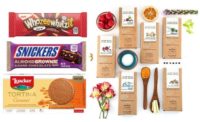Less than two months ago Michael Moss, CEO of the Sweet Shop in Mount Pleasant, Texas, was worried he would have to lay off employees amid the COVID-19 pandemic. Now, he’s hiring temps to help his full-time staff keep up with all the work.
And it’s all because of face shields.
The idea came to him in mid-March while watching the Today Show. A reporter was highlighting nurses making face shields in their break room out of supplies they got at the local craft store.
“It just looked really sad to me,” Moss said. “I just looked at my wife, and I said, ‘I’m sure this sounds like a crazy idea, but I wonder if we could make facial shields to help. Am I crazy?’ And she said, ‘No, I think it’s a great idea!’
That was Friday, March 13.
Then he connected with the plastics supplier he usually uses to get plastic for the chocolate boxes, and a ribbon supplier who was able to get him elastic. By Tuesday, March 17 they had a prototype, and he had asked his candy brokers to start trying to sell them.
“We had orders Wednesday morning, and we have not stopped,” Moss said. “We shipped our first ones on Thursday the 20th.”
In the last month and a half they have produced over half a million shields, with more orders pending. They are running three shifts, and their production capability is now up to 200,000 shields per week — or one shield every 3 seconds of the day.
“The demand has been what’s been so shocking to me,” Moss said. “There were weeks there, we were getting calls from buyers just in tears. It was just a dire situation. As a candy company, the weight of that, it was very humbling. We were supplying something that was saving people’s lives.”
While they started with one model of face shield, they now have four different versions of face shields. And the face shield division even has its own name, Waymakers.
Don’t worry, they’re still making chocolate, though. While about 20,000 sq. ft. of factory space has been used to produce the face shields, the rest of the 80,000-sq.-ft total factory space is still being used for candy lines. And Moss said demand for sweets is actually starting to pick back up.
Initially, most of the face shields were being sold to hospitals and medical professionals, but they’ve started to get orders from a different sector now — USDA and FDA factories looking to protect employees.
Hershey commits $1 million to making face masks
Sweet Shop isn't the only company with ties to the confectionery industry stepping up right now.
The Hershey Company also recently committed $1 million to acquire, install and staff a new manufacturing line dedicated to the production of face masks.
The new line, which will be capable of producing up to 45,000 masks per day, will become operational near the end of May.
“Supporting our communities in difficult times is part of our legacy, and an important value that our current employees share,” said Michele Buck, president and CEO. “From the building projects that created local jobs during the Great Depression, to producing military rations during World War II, we take great pride in making a difference where we can.”
Leveraging its internal engineering capabilities, and its relationships with equipment manufacturer JR Automation and General Motors, who is making similar masks, the company said it is moving quickly to address the nationwide shortage of protective equipment.
“Disposable masks will be an integral piece of protecting the health and safety of our employees, their families and our community as we move forward over the weeks and months ahead,” said Jason Reiman, Chief Supply Chain Officer. “Changing how we work, and adding this capability is a testament to the adaptability of our team, and our desire to make a difference.”
Suppliers also step up
Meanwhile, suppliers are also helping to fight the pandemic.
Bedford Industries, known for producing twist ties, bendable components and closures for the baking and snack industries, is making face shields.
The Worthington, Minn.-based Bedford — which employs more than 400 people — designed and developed a working prototype in less than 24 hours in mid-March, after CEO Jay Milbrandt and colleagues saw news reports of shortfalls in N95 and PPE supply for medical workers.
“I came into the office and gathered several teammates, including engineers and designers,” he said. “We asked ourselves, ‘What can we do with our experience and facilities to help health care workers desperate for PPE?’”
Greiner Assistec, which manufactures plastic packaging, also has started developing and producing protective masks made of plastic.
The team is using its existing expertise to spontaneously implement new products that are urgently needed at this time.
“We applaud everyone who has a really tough job to do out there right now — whether in the health-care sector, in the police, or as part of the food supply chain,” says Karl Berger, v.p., Greiner Assistec. “As experts in the field of plastics processing, we have the skills and knowledge needed to implement these kinds of product innovations at relatively short notice — which means that we’re able to help in situations like the one we’re currently facing.”
Indeed, it’s the remarkable ability of all of these companies to so quickly transition to PPE that has shown the true colors of those with ties to the confectionery industry.
And no doubt, it’s the same quick thinking and adaptation that will help get us through this.





